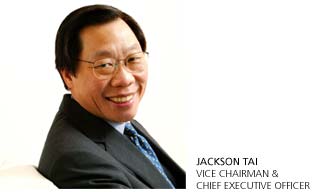
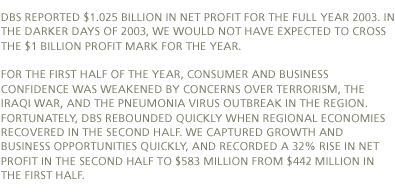
Our franchise was resilient because of our strategy of expanding our regional business and reducing our reliance on traditional bank lending and deposit products. The significant and sustained growth of our non-interest income businesses cushioned our bottom line during a period of declining interest rates and sluggish economic conditions in our two key markets, Singapore and Hong Kong.
Even with the challenging circumstances, we remained committed to our initiatives in risk management, up-to-date technology and operations, and strong corporate governance. The payback from these initiatives and investments will become evident as we work to establish DBS as a sound, well-run Asia-based bank.
Banking is about scale, distribution and customer access. Recognising this, DBS and Shin Corporation announced in December the formation of a consumer finance joint venture, Capital OK, in Thailand. The joint venture will sell unsecured loan products, including credit cards and personal credit lines, through Shin Corporation’s nationwide retail outlets. Capital OK will also leverage Shin Corporation’s established resources and customer base, including over 12 million customers from Shin Corporation’s telecom subsidiary, Advanced Information Systems.
In March 2004, we announced an agreement with Thai Military Bank (TMB) and The Industrial Finance Corporation of Thailand (IFCT) to merge TMB, IFCT and DBS Thai Danu Bank, our 51.7% subsidiary in Thailand. The proposed merger will create the country’s fifth largest bank with combined assets of Bt 677 billion ($29 billion), close to four million customers, 462 branches and 963 ATMs across Thailand.
The merged bank will be a larger, more competitive franchise in Thailand, one that combines the large distribution network and broad customer reach of TMB, IFCT’s strength in industrial and project finance, and DBS’ and DBS Thai Danu Bank’s best practices in corporate governance, financial product development, risk management, as well as technology and operations infrastructure. As a strategic partner to the merged bank, DBS will provide expertise
and resources through technical service agreements in credit, market and operational risk management, treasury and markets, consumer banking, corporate and institutional banking, SME banking, and technology and operations.
The expansion of our geographic footprint started with very measured steps back in 1998 when 80% of our assets and operating income was concentrated in Singapore. Today, the concentration in Singapore has been reduced to about 60% and Hong Kong contributes about 30% to assets and operating income.
We continue to carefully pursue opportunities in the region both to grow organically and to scale up through acquisitions in higher growth markets. Our immediate focus will be to broaden our franchise in Greater China, Asean and in South Asia. While DBS is frequently the subject of speculation as a buyer of other banking franchises or assets throughout Asia, we believe our stakeholders will increasingly judge us by what we actually do, and not according to unsubstantiated reports.
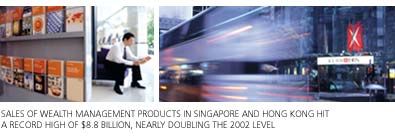
Looking back, forging ahead
Banking in Asia has fundamentally changed. In the early-to-mid-1990s, even the most simplistic banking models were successful as the massive inflows of funds from around the world helped stimulate money supply and, in turn, fuelled exceptional loan growth throughout the region.
In the aftermath of the Asian financial crisis, local economies recovered, but corporate lending slumped against a backdrop of excess capital, heightened price competition among banks, and increasingly thin interest margins. Consumer and SME markets showed modest growth, but price competition became commonplace.
Notwithstanding intense competition in the region, DBS grew its loan book in 2003 by 6% to $64.3 billion. But interest margins in core products including mortgage loans continued to tighten, depressing the overall interest margin.
Recognising that interest margins would continue to come under pressure, we deployed resources to build and expand non-interest income businesses, achieving considerable success. DBS’ non-interest income rose 21.5% to a record $1.823 billion, four times the $446 million in non-interest income in1998. The ratio of non-interest income to operating income is now 43.4%, and we are beginning to see the fruits of our investments in people, systems and capabilities in these businesses.
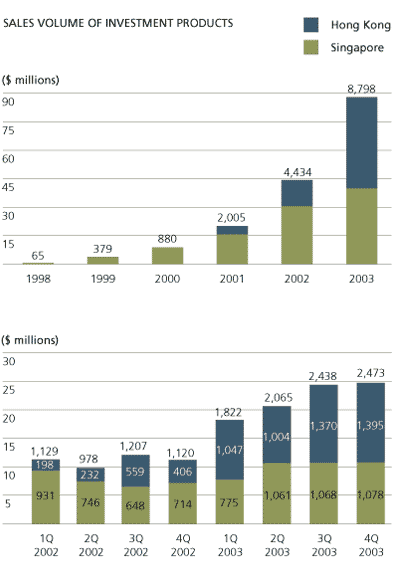
Unique role in intermediating excess captial in Asia
DBS differentiates itself through a unique ability to intermediate excess capital in Asia. We originate mandates through our dominant SME franchise in Hong Kong, and through our unmatched access to corporate and SME issuers in Singapore and the rest of the region. We are able to structure, repackage, hedge, underwrite or privately place these requirements through our dominant retail distribution in Singapore and Hong Kong, where we are today the fourth largest banking group.
The success of our wealth management business exemplifies our ability to engineer and distribute sophisticated investment products that are not ordinarily available to the consumer markets in Asia. Our progress underscores our belief that we can serve our customers’ best interests by helping them capture value from changes in interest rates, currencies and securities, while mitigating risk through product or deposit structuring.
Last year, DBS sold a record $8.8 billion worth of investment products including capital protected and capital guaranteed funds, equity-linked notes and unit trusts through the Group’s multiple distribution channels in Singapore and Hong Kong. This compares with Group total sales of $379 million in 1999 when we were selling mostly third-party funds.
We invested significantly in our Treasury and Markets’ structuring capability over the past few years. Today, we are a leader in the origination of investment products in Asia.
Breaking down the silos
On average, we brought three new DBS-originated investment products a week to our customers in Singapore and Hong Kong in 2003. The speed of delivery for these products reflects nimble, yet highly orchestrated execution across functions, departments, and geographies. Our product engineers in Treasury and Markets keep abreast of investor needs through close collaboration with their colleagues nearest to the customers, in Consumer Banking, Private Banking, Enterprise Banking and Investment Banking.
With our employees working as a team instead of in silos, DBS responded swiftly throughout the year to changing market conditions, often “reverse engineering” products to suit customer needs. In the first half of 2003 when interest rates were low and risk aversion high, we offered mainly capital guaranteed funds. When the equities market started to bottom out after the pneumonia virus outbreak in the second half, we launched funds linked to the performances of highly liquid, blue-chip stocks and stock indices. In the fourth quarter, our product specialists led the revival of the call warrants market in Singapore, and these instruments proved highly popular with investors.
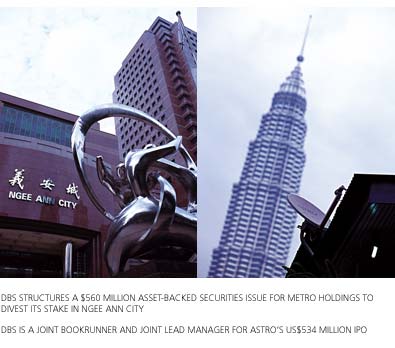
Making a mark in the region
DBS Bank (Hong Kong) profits were up 33% to $440 million for the year. Operating income was up 9%, largely on the back of record sales of wealth management products that were structured in Singapore and distributed though our branches in Hong Kong. In fact, Hong Kong outsold Singapore with only 25% of Singapore’s customer base. At the same time we have been able to further streamline operations and reduce expenses by 2.5%. Trends in the second half of the year have been encouraging, particularly as we see unemployment and bankruptcy petitions on the decline and asset deflation moderating.
Sceptics were quick to criticise our acquisition of Dao Heng Bank, and many doubted DBS’ ability to integrate and achieve synergies in Hong Kong. In fact, our fully integrated DBS Hong Kong operation has enhanced the Group’s results. Many key ratios in Hong Kong, such as net interest margin, cost-income ratio, the non-performing
loan (NPL) rate and return on equity, are better than the average for the Group. We have leveraged our Singapore product origination capabilities to capture Hong Kong’s growth prospects.
During the year, we received legislative and regulatory approval to merge the banking licenses of our Hong Kong banking franchises. Following the full integration of front and back-end operations, our Hong Kong banks were rebranded DBS Bank (Hong Kong) Ltd. We also adopted the Chinese name  . .
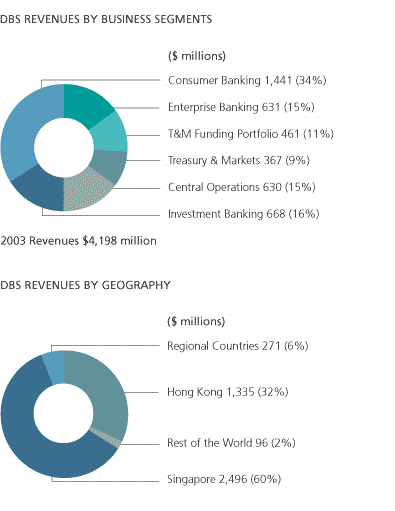
Growing a higher return SME franchise
Momentum was strong for our Hong Kong SME (Small and Medium-sized Enterprise) franchise last year. We maintained our 12% trade finance market share, second only to an entrenched financial institution. Trade loans grew nearly 20% last year as we provided banking and financial services to our Hong Kong SME customers, as well as to Taiwanese and Singaporean companies operating in China. Our franchise will benefit as the Closer Economic Partnership Agreement (CEPA) opens up opportunities for the service sector in China and Hong Kong.
In Singapore, we are devoting more resources to grow our SME business by upgrading credit skills, developing specific industry specialisation, and strengthening product capabilities to deepen and broaden our market penetration. Our aim is to serve our SME customers locally, but also as they expand their operations into Greater China, Southeast Asia and South Asia. Our partnership with TMB and the IFCT, for example, will enable us to provide locally relevant services to our regional SME customers. At the same time, we will be able to offer TMB and IFCT customers our range of SME banking and capital market products and services.
Award-winning year in Investment Banking
Our end-to-end origination, intermediation and distribution capabilities differentiate DBS in Asia. We have strong access to retail, SME and corporate customers throughout the region. At the same time, DBS distributes securities and financial products through our ATMs, internet banking, DBS Vickers’ brokerage operations, private banking network, as well as through our traditional institutional coverage. We reach traditional institutional investors, high networth investors, as well as the aspiring mass affluent market. We reinforce our intermediation with regional expertise and leadership in equity
capital markets, debt capital markets, loan syndication and treasury.
Earlier in the year, we improvised quickly and decisively in sourcing competitive funds on behalf of clients during the SARS outbreak. In one case, when we found ourselves grounded by quarantines and travel restrictions, we organised a virtual roadshow for the $684 million initial public offering for Singapore Post, the largest in Singapore last year. The international placement, subscribed by 10 times, drew interest from international institutional investors despite our inability to meet them physically. Our investment bankers conducted 80 hours of meetings in 11 days with 125 institutional investors from Hong Kong, Japan, Continental Europe, the United Kingdom, and the United States, through video-and telephone conferencing. The retail portion of the offering was 5.6 times subscribed, with 72% of the total retail offer covered by DBS ATMs and internet banking. The virtual roadshow helped the Singapore Post IPO win a 2003 deal of the year award from Institutional Investor magazine.
Throughout the year, DBS landed several high-profile deals in the region in competition with global and regional financial institutions.
Our efforts were recognised in the numerous awards and accolades from international and regional publications. The syndication team, in particular, became the first non-US bank to win the coveted IFR Asia’s Asian “Loan House of the Year” award and was commended by the regional magazine for “doing intelligent, high-profile structured transactions that add value to the development of the market.”
Following our introduction of real estate investment trusts (REITs) in Singapore for two prestigious Singapore clients, we launched the Fortune REIT, the first real estate investment trust for a Hong Kong issuer. This HK$906 million offering by the Cheung Kong group was 3.7 times subscribed, with 48% of demand covered by Asian retail investors.
We also brought our regional distribution capabilities, both institutional and retail, to the largest IPO in Southeast Asia in 2003, the IPO for Malaysia’s Astro All Asia Networks Plc, a global mandate where DBS featured as the only Asian Joint Bookrunner and Joint Lead Manager. This deal was awarded FinanceAsia’s “Country Deal 2003 (Malaysia).” We also applied our syndication muscle in arranging a US$230 million syndicated loan for Kumpulan Guthrie, and a $220 million leveraged buyout financing of the assets of SingTel’s Yellow Pages.
We were particularly successful in leading key mandates in the telecommunications, media and technology sector. The US$600 million financing for South Korea’s Hanaro Telecom was the largest sponsor-related telecoms financing in Asia ex-Japan for the year. DBS was also the lead manager for a US$400 million dual-tranche syndication for LG Philips LCD.
Our debt capital market team continued to top the Singapore dollar bond league table, managing the inaugural bond issues of Singapore Post, Senoko Power and SP PowerAssets. The latter raised in excess of $3.8 billion, one of the largest bond offerings out of Singapore.
In mergers and acquisitions, we leveraged our regional presence, multi-product expertise and financing capabilities to complete 38 transactions worth US$3.88 billion last year. Thomson Financial ranked DBS first by number of deals completed in Asia ex-Japan, and number six by value.
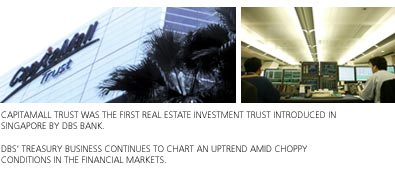
Extracting higher profitability from Consumer Banking
Although the home loan price war in Singapore abated towards the end of the year, interest margins remained slim as rates fell by as much as 150 basis points during the year. The first-year fixed rate for housing loans, for example, fell to 1.5%, down from 3% the year before.
In May, DBS introduced the innovative Mortgage 1-2-3 plan, which gives customers greater flexibility in repayment than standard home loans. The plan proved popular just as Singaporeans’ wages and their Central Provident Fund contributions were being cut.
DBS’ Singapore mortgage loans outstanding grew 7% in 2003, reversing the decline in 2002. Notably, DBS’ higher margin unsecured loan products registered strong growth. Credit cards receivables rose 24%, while Cashline receivables were up 62%.
We offered financial advisory services and tailored lifestyle financial products and services to meet the needs of our affluent and high networth customers. We now have more than 30,000 Treasures Priority Banking and Private Banking customers each in Singapore and Hong Kong serviced by dedicated relationship managers. Our business model emphasises service, flexibility and responsiveness.
In another successful consumer banking initiative, we launched in October a DBS-Amex Black Card targeted at young, upwardly mobile Singaporeans seeking an alternative to the traditional Gold Card. We received an overwhelming response, with some 50,000 applications in the first month of launch.
The consumer banking team also moved swiftly to tap opportunities in the region’s nascent budget airlines industry. We signed agreements with AirAsia, Malaysia’s low-fare carrier, and Singapore’s ValuAir, to provide them with co-branded credit cards as well as to manage their respective online payment processing operations.
|